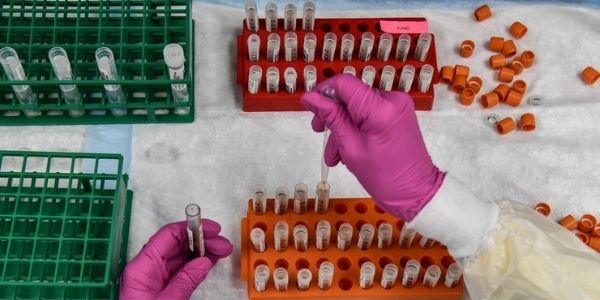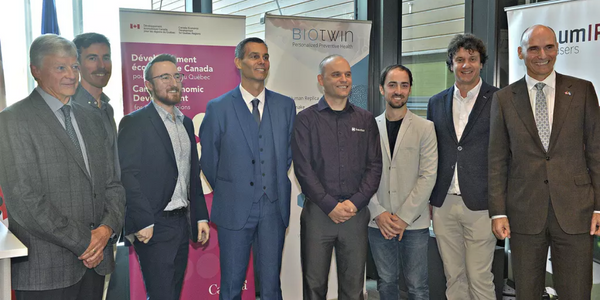The dynamic development of technology is accelerating innovations in all areas. The life sciences industry, in particular, has been benefiting from advances in the artificial intelligence sector: Quebec has produced innovative projects which serve to deepen research, clarify a diagnosis, personalize care, and support hospital treatments. Here are a few of them.
Artificial Intelligence, Research’s Great Ally
Biobanks: a Quebec Research Resource
Sequencing the entire genome has been generating an incalculable amount of data which is impossible to analyze and further investigate on a human scale. While it has many useful purposes, artificial intelligence is particularly helpful for comparing DNA sequences and identifying the genes responsible for various diseases.
Quebec has a plethora of biobanks and enormous, comprehensive DNA banks. One such organization, Génome Québec, oversees, finances, and manages many genomic research projects being carried out in the province.
Modelling the Structure of Macromolecules to Understand them Better
However small they may be, the 3D structures of proteins influence how they function. Researchers are using artificial intelligence for more detailed visualization of these components, to understand which portions are vital to their activities, and to find new therapeutic targets.
This type of research is the basis of a major collaborative project between Génome Québec, the IRIC, and MILA. Most notably, genomics will make it possible to clarify how the COVID-19 virus interacts with human cells, while artificial intelligence will model molecules that will prevent this contact. Medicinal chemistry teams will then manufacture and test these inhibitors (Learn more here).
Accelerating Discovery
The discovery of new drugs is a long and uncertain undertaking. Artificial intelligence is used to accelerate this process by developing models that help predict the activity of the molecules being tested, so that only the best candidates are chosen for bioassays. This strategy reduces trial-and-error testing and increases research projects’ success rate. A young Quebec company, Invivo AI, has been making promising advances in this type of deep learning.

Algorithms Helping to Diagnose Diseases
Diagnosing a disease is more complex than it may seem, as this phase encompasses physical exams, symptoms, blood tests, imaging, and the patient’s medical and family history. Artificial intelligence can support healthcare professionals in many aspects of data analysis and decision-making.
The Benefits of Better Diagnoses
Sharper analyses of X-rays or biopsies by pathologists lead to faster diagnoses. Indeed, a disease that is detected early is easier to treat and results in an improved prognosis. A more accurate diagnosis also means that a patient won’t have to see a specialist, which helps to relieve the strain on the healthcare system.
Early Detection of Diabetic Retinopathy
An excellent example of using artificial intelligence to support the diagnostic process is that of Diagnos. This Quebec-based company has developed CARA (Computer Assisted Retinal Analysis), a tool used to analyze the back of the eye. It allows for the early detection of signs of diabetic retinopathies: the algorithms generate retinal images that are sharp, clear, and easy to examine. By comparing photographs taken at different times, it is easier to track the evolution of lesions and the disease’s progression.
Innovative Cancer Projects
During the joint Onco-Tech competition, the Oncopole, MEDTEQ+, the TransMedTech Institute, and the Cancer Research Society invested $2.6 million to support innovative oncology and medical technology projects. Several of these projects focused on artificial intelligence-assisted diagnosis (Learn more here).
Using Artificial Intelligence to Customize Treatments
The development of high-throughput DNA sequencing techniques has made the concept of personalized medicine a reality. Since each person has a distinct genetic background, individuals respond differently to the treatments they receive. By analyzing these variations, therapies can be adapted to individual profiles.
Studying the genetic profile of the different types of cancer and the traces left by diseases (biomarkers) leads to better identification of pathologies, effective monitoring of their evolution, and targeted and adapted treatment options. Artificial intelligence greatly facilitates the analysis and interpretation of gene bank and biobank data, so that the right drug can be found for the right person.
The Digital Health and Discovery Platform (DHDP)
The Digital Health and Discovery Platform (DHDP) is a pan-Canadian initiative that integrates genomic data with information gathered from imaging and medical records to advance collaborative precision medicine. A consortium of nearly one hundred partners has invested $272 million to make this initiative a success, with the federal government contributing $49 million. Several Quebec organizations are participating, including Imagia, MILA, IVADO, the McGill University Health Centre (MUHC), the Jewish General Hospital (JGH), MEDTEQ+, Prompt, The Montreal Neurological Institute (Neuro), Amplitude, Génome Québec, Centre hospitalier de l’Université de Montréal (CHUM), Caprion, and Mitacs (For more information: Press release, La Presse article – in French only).
Applications to Improve Hospital Operations
Artificial intelligence is playing an increasingly important role in improving practices and medical care in clinics and hospitals.
Virtual Triage in Emergency Departments
The CHUM is working with Dialogue, a Montreal-based Canadian market leader in virtual health care, to implement a patient triage system using artificial intelligence software. When arriving at the emergency department, patients answer a form whose questions have been adapted, based on the previous answers. This process serves to collect as much information as possible to most accurately establish priority ranking and give the physician a comprehensive overview of the patient’s health condition (For more information about this pilot project; for more information about the CHUM’s artificial intelligence innovations – in French only).
Computer-assisted Surgery
Performing robotic-assisted surgery is becoming more common. Devices can analyze preoperative data and guide the surgeon throughout the procedure. For example, Montreal-based Minogue Medical Inc. has developed the da Vinci robot, which makes it possible to perform routine and complex procedures through small incisions, similar to traditional laparoscopy surgery. This automaton has already operated on more than 6 million patients in nearly 5,000 hospitals around the world.
Remote Monitoring of Patients
Artificial intelligence can provide accurate monitoring of patients’ physiological parameters and makes it possible to closely follow their state of health: heart rate, body temperature, blood sugar levels, sleep habits, etc. Applications can detect abnormal changes and issue alerts. These tools are useful for remote monitoring, but also for patients in intensive care. Algorithms can detect changes in an individual’s vitals sooner and quickly alert the healthcare team.
